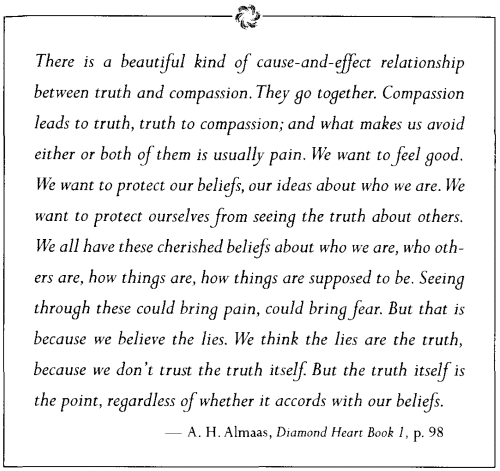to judgment is compassion. Because the judge sees only what is wrong and what needs fixing, you know you will get no compassion from it. You will therefore be wary of exposing painful, scary, or negative parts of yourself, for you can be certain the judge will make you wish you hadn’t. Everything you think and feel can be used against you. Its job is to maintain the status quo, to protect you by maintaining a restricted sense of self.
If you expand or feel too good, the judge will give you a “dose of reality”; if you shrink too much or collapse, it will remind you that things aren’t so bad and that you will survive. Its job is not to validate you, acknowledge your courage, or appreciate your pain.
At best, the judge will try to fix your pain, tell you what you did wrong that made you feel hurt, how to take care of it, why it’s not worth worrying about, or how you have felt much worse. In this way, the judge mirrors all the ways your pain and hurt were dealt with as a child.
Certainly, when specific actions or events cause physical or emotional pain for a child, it is appropriate for parents to do what they can to remove or minimize the source of the hurt. In this way, many people got help with physical pain and attention to emotional pain. However, the situation was different when the source was not clear or could not be removed, such as a divorce, the death of a family member, a parent’s depression, or peer pressure at school. In these situations, few people had their pain accepted and held as natural.
Emotional pain in a child was often uncomfortable for the parents because it reflected an element of life they couldn’t control or were intolerant of in themselves. This discomfort shifted the parents’ focus to getting rid of the pain through denying, avoiding, discounting, or compensating for it. The child learned to feel that something was wrong if she was feeling pain. When the pain was treated as a problem, ultimately, the child came to believe she was somehow a problem for having the pain in the first place. As a child, part of you longed to have someone just be there with you in your pain, listen to you, hold you, and show you that pain is a natural part of life. This is what compassion does.” – Byron Brown, Soul without shame, a guide to liberating yourself from the judge within.
